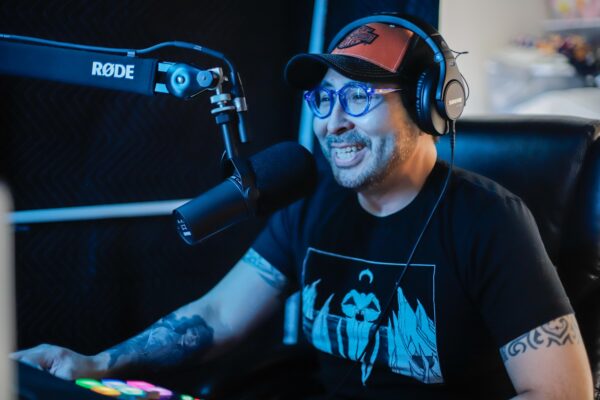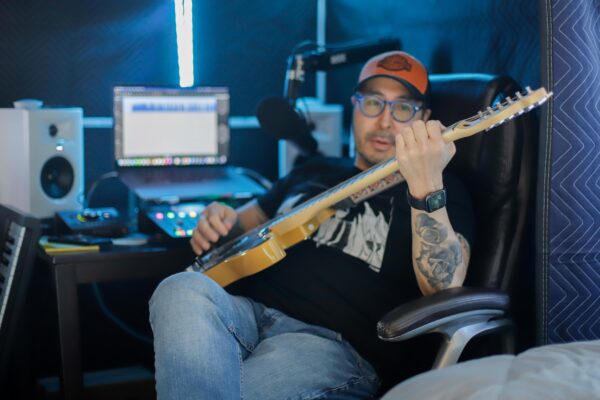
Ralph Sara is hitting the large time.
“This is my studio,” Sara stated, pointing to a rectangular body built of PVC pipe draped with blue going blankets. “It’s the bedroom.”
He laughed as he showed off the set up in his Anchorage apartment, but it is really even larger than his last studio.
“You know, when I very first commenced executing the podcast, I was upcoming door in the closet,” he stated.
Sara, who is Yup’ik and from Bethel, calls his show The Anonymous Eskimo Recovery Podcast. It capabilities interviews with people today about their recovery journeys. When Sara started off it, back in 2020, he experienced just left residential procedure, was attending a large amount of Alcoholics Anonymous meetings and was hoping to repair his interactions with his relatives.
“When I commenced the podcast, I did it selfishly for myself,” he stated. “I assumed, ‘This podcast is likely to hold me accountable ‘cause if I’m accomplishing this podcast, I can not do it when I’m consuming or else it’s just a farce.’ You know, I’m lying to everyone, so I can’t do that.”
Hear to this tale:
Sara explained himself as a continual relapser. He mentioned he wished to be sober but constantly discovered causes to consume. Then, he received a felony DUI when driving his bike and ended up at an additional residential remedy middle. Last but not least some thing clicked.
“I didn’t want to shed everything any more,” he claimed. “I did not want to shed my family all over again. You know, my youngsters, my beloved ones.” He paused then joked, “And the material matters of training course.”
He resolved to finally open up up to one of the clinicians. He talked and wrote about his past.
“I had a ton of time in treatment method,” he mentioned. “So I wrote and wrote. I wrote it kind of like a ebook.”

Sara considered that a book felt like a massive job to endeavor, but a podcast could be doable. When he left treatment method, he appeared up Indigenous recovery podcasts and could not locate any. So he started his possess. He knew that listening to people’s recovery tales was beneficial for him and would continue to keep him on keep track of.
In the starting, to get company for his exhibit, he would scroll by means of social media posts and ask individuals who wrote about their restoration journey to come on his podcast. Some men and women explained no just mainly because of the show’s title — Sara’s humorous dig at both equally AA and modifying language. Now, he claims men and women method him to be on the plan.
“People are beginning to be happy of getting in restoration and demonstrating other persons they are not alone, that it’s doable to get better and it is achievable to aid other people today by sharing their tales,” he stated.
Since mid-2020 he’s created a lot more than 60 episodes and spoken with people today from across the continent and from close to residence. A single of his most current episodes options Jeff Egoak from Napakiak. The two males satisfied initially in Bethel yrs in the past then again when Egoak worked at the front desk at the therapy center wherever Sara acquired assist.
In the course of the episode, Sara instructed Egoak, “Seeing a different Indigenous man there performing, supporting — it just intended the globe to me.”
Egoak replied that he wishes to raise people’s morale when they stroll into the middle. He greets Native individuals in Yup’ik so they experience far more welcome.
“I’m happy I was there to encourage and to assistance,” he informed Sara. “And you know I’m a seriously large advocate for sobriety.”
For the podcast, Sara reported he generally speaks with Indigenous people for the reason that their voices are underrepresented in the recovery planet.
“Being Indigenous, I assume, and owning this podcast presents other Indigenous men and women a voice that they’d hardly ever had in advance of because it was so frowned on to discuss about what you are likely through,” he claimed.
He feels like when he was growing up, persons could not chat about their trauma or psychological overall health difficulties.
“You can not cry if you are a Native person, you know?” he reported. “You simply cannot chat about issues that are bothering you or hurting you. You have to be the strong, stoic individual, ideal?”
Sara, a long-time musician, pitched a e-book about his everyday living to the Rasmuson Basis making use of what he wrote all through cure together with ideas to produce an album to accompany it. He won 1 of their 2021 Individual Artist Awards. That is when he had to update from the closet to the bedroom, so he’d have house to record songs, as well.

He’s still drafting songs and performing on the guide. It is a long but healing approach.
“It’s sort of treatment for me to permit it back again up and then enable it out yet again,” he mentioned.
Sara claimed he hopes his story will enable men and women just like the podcast served him and his listeners — by reminding them they are not by itself and that recovery is attainable.
This tale is part of an ongoing solutions journalism job at Alaska Public Media about destigmatizing psychological well being. The challenge is funded by a grant from the Alaska Mental Well being Have confidence in but is editorially impartial.
[Sign up for Alaska Public Media’s daily newsletter to get our top stories delivered to your inbox.]
